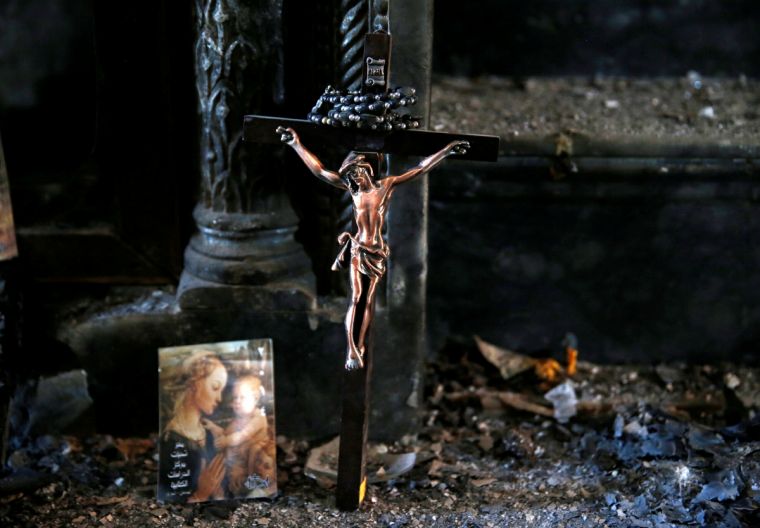'By God, we will break your cross': ISIS' Harrowing Vow To Christians In Iraq

As Christians begin to return home after liberation from ISIS in Northern Iraq, the harrowing reality of ISIS occupation is beginning to emerge.
Scrawled in red on the walls of one shop in Qaraqosh – a majority Christian town not far from Mosul – are the words: "By God, we will break your cross", Reuters reports.
In one church visited by the news agency, a statue of Jesus had been decapitated, while Bibles had been ripped apart and scattered across the floor.
Though ISIS has now been pushed out of a number of towns in the Nineveh Plain as part of the offensive to take back Mosul, the militants' last stronghold in Iraq, the past two years have left Iraq's Christians uncertain about their future.
"I am 64 years old," one Christian man said. "If I were young I could start again, but at this age what can I do? We [Christians] have no future in Iraq."
Qaraqosh once had the largest Christian population in the country and was home to at least a quarter of Iraq's Christian community. However, Kurdish troops stationed to protect the town withdrew on August 6, 2014, leaving ISIS free to move in overnight and take it along with a number of other Christian-majority towns in the region.
Tens of thousands of people were then forced to flee after ISIS issued an ultimatum to Christians: leave, convert to Islam, pay a heavy tax or be killed.
Though in many of the liberated towns are not yet safe enough for civilians to return home, priests have begun visiting their churches in the wake of the devastation.
On 30 October, dozens of Iraqi Christians celebrated mass at the Church of the Immaculate Conception in Qaraqosh.
"Today Qaraqosh is free of Daesh (Islamic State)," Syriac Catholic Archbishop of Mosul Butrus Moshe – who was born in the town – told worshippers.
"Our role today is to remove all the remnants of Daesh," he added. "This includes erasing sedition, separation and conflicts, which victimised us.
"Political and sectarian strife, separating between one man and another, between ruler and follower, these mentalities must be changed."











